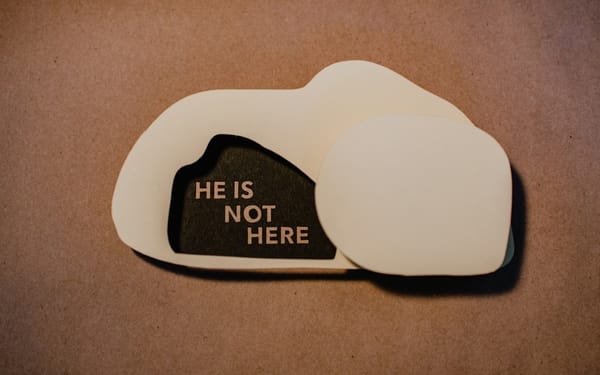How Do I Battle Distractions?
Why am I always looking at my phone? How do I stop chasing the next thing and be present in the moment? Here are a few tips.

What I would like to do right now is to remove all distractions and write this article. I want to focus, unplug from everything else, and be present in the moment. Instead, what is happening? I remember that I need to find a hotel for an upcoming trip. I see my To-do list out of the corner of my mind.
Oh, and my phone is in front of me. It’s probably a good time to take a break and play a game, check some sports scores, and check e-mail. I also need to do a little reading to prepare for an upcoming afternoon meeting.
We all experience this daily challenge of a busy, active mind and have continual distractions. This occurs no matter where we are or what we are doing—whether at work, home, out to eat, church, talking, praying, or sleeping. A recent survey revealed that “The average American checks their phone 205 times a day, or almost once every five minutes while we’re awake.”[1]
This statistic is probably boosted by the fact that we don’t want to miss anything important, so we set our notifications on our phones accordingly and, in the process, increase pop-up distractions. Screen time is likely the biggest culprit preventing us from focusing and being present in the moment.
We can blame it on our phones and devices, but in reality, it is a battle of the mind. The battle between the ongoing distractions versus a focused, unplugged mind that is present in the moment.
An Undistracted Dad
When I was growing up, my dad provided an example for me of how to approach work-life balance. He was a Nuclear Physicist, and when he came home after an 8-hour workday, he would usually take a short nap. I never asked him, but I imagine it was a chance to empty out his mind of work and transition to being home with his family. And that’s exactly what he did. He was fully present and engaged in enjoying time with us. I never felt like he was pulled towards his work. Every day my dad made the purposeful choice to not be distracted in the evenings and weekends with work or other potential distractions of that era.
In today’s vernacular, my dad was very successful at unplugging from work and being present. To be fair, the world back then did not include smartphones, social media, the internet, e-mail, and streaming—all the potential distracting sources of this era. However, the story of Mary and Martha in Luke 10:38-42 reminds us that distraction is a human issue, not just a present-day issue.
Jesus and the disciples came to visit Mary and Martha in their home. Mary sat at the Lord’s feet, listening to what he said, while Martha was “distracted by all the preparations that had to be made.” Note that without Martha’s efforts, there may not have been what was physically needed at the time (a meal or place to sleep). However, Jesus responds to Martha: “You are worried and upset about many things, but few things are needed.” Jesus was always about people, making sure they were seen and heard, meeting their needs, and he was a perfect example of being “present in the moment.”
We all have important and necessary endeavors each day, and we are bombarded with many different thoughts, ideas, and things that need or want our attention. But are we too often distracted to the point where the “many things” take charge, occupying our minds, getting us worried, upset, and not present in the moment as to what (and especially who) is truly important?
Satan loves nothing more than to distract us from the truly important. As 1 Peter 5: 8 says, “Be alert and of sober mind. Your enemy the devil prowls around like a roaring lion looking for someone to devour.” If we’re not careful, we can too easily be devoured by distractions.
We Have a Choice
What we do with all the distractions is up to us. Distraction can become a vicious cycle, with distractions feeding on distractions, and over time, we may train our brain to be most familiar and comfortable in a distracted state. Unfortunately, this can be connected to having an anxious mind, a mind that has difficulty focusing and does not know how to unplug and rest or enjoy quiet. It can also disrupt sleep.
During my career as a software developer, I would periodically get in a place where the software was working adequately but had some glitches. I would sometimes spend several days trying to figure out where an error was in the program. With my dad as an example, I would try to set aside work in the evening and do normal life. This was also helpful in getting good sleep. There were many times in those situations, with a work problem to solve, where I would be sleeping like a baby and wake up in the middle of the night knowing where the error was hidden.
More times than not, when I started my work day, and focused my efforts on what I discovered in the night, sure enough—problem solved! It’s amazing what can happen when your brain rests from work. I was purposefully disengaging from the problem, but I guess my “background processor” was active when I didn’t even realize it.
Steps to Take
What can we do to help reduce distractions, unplug, and be present in the moment? Here are a few steps:
Step 1: Assess—Honestly ascertain how much of a problem distraction is for you and what are some of your biggest distractions. Check your phone to see how much you are on it and where you spend your time. What about other screen time? It may help to talk with a trusted friend or companion and ask them how much you are present in the moment. This is similar to budgeting – one doesn’t know how to improve one’s financial situation until one understands where all the money is going.
Step 2: Lean on God—Pray at the beginning of each day and as needed throughout the day for the right focus, priorities, and being present in the moment. See reference [2] for more specifics, sample prayers, and scriptures to guide you.
Step 3: Evaluate—When distractions come up that take away from you being present in the moment, ask: how critical is it that I engage with this distraction right now? What if I ignore it, at least for now? Remind yourself, as Dan Sullivan says: “The first rule of focus is this: ‘Wherever you are, be there.’”
References and More Reading:
[1] Cell Phone Usage Stats 2025: Americans Check Their Phones 205 Times a Day, Reviews.org, January 2025, https://www.reviews.org/mobile/cell-phone-addiction/.
[2] Corine Williams, 10 Bible Verses to Overcome Distraction, Therapy for Christians, 2022, https://therapyforchristians.com/blog/10-bible-verses-to-overcome-distraction.
[3] John Mark Comer, The Ruthless Elimination of Hurry (Colorado Springs: WaterBrook, 2019).
[4] National Sleep Foundation, “Screen Use Disrupts Precious Sleep,” National Sleep Foundation, 2022, https://www.thensf.org/screen-use-disrupts-precious-sleep-time/.
[5] American Academy of Sleep Medicine, “Over Three-Fourths of Americans Lose Sleep Due to Digital Distractions,” AASM, 2023, https://aasm.org/over-three-fourths-of-americans-lose-sleep-due-to-digital-distractions-sleep-experts-urge-a-change/.





